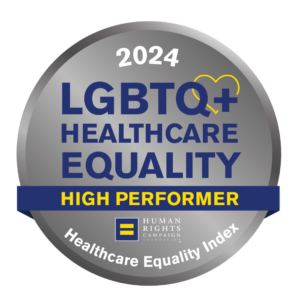NorthLakes is one of 462 healthcare facilities nationwide earning the “LGBTQ+ Healthcare Equality High Performer” designation

The Healthcare Equality Index (HEI) is the national LGBTQ+ benchmarking tool that evaluates healthcare facilities’ policies and practices related to the equity and inclusion of their LGBTQ+ patients, visitors, and employees. It is also a measure of awareness to welcome and support gender, sexual and romantic minorities.
A record 1,065 healthcare facilities actively participated in the HEI 2024 survey and scoring process. Of those participants, 462 received the “LGBTQ+ Healthcare Equality High Performer” designation – including NorthLakes, with an evaluation of 80 out of 100. The evaluation criteria included the following categories:
- Non-Discrimination and Staff Training,
- Patient Services & Support,
- Employee Benefits & Policies,
- Patient & Community Engagement, as well as
- Responsible Citizenship.
“This tool is a guide for clinics and hospitals to inventory and create practices to counteract discrimination. The HEI is also a guide for LGBTQIA+ people to identify safe spaces to meet health needs without fear of being treated badly,” said NLCC’s LGBTQ+ Committee Chair, Tamilyn White. “NorthLakes acknowledges the long history of discrimination and victimization of LGBTQIA+ people by the healthcare system. We are committed to reversing eons of marginalization. This is reflected in our mission: To respond to the health care needs of our communities with an integrated array of quality services and actively remove barriers to wellness. We welcome people from all walks of life to engage in the services we offer because access to quality healthcare is a basic human right. No one should be afraid to see a doctor or a chiropractor or a dentist because of who they are, who they love, or how they identify.”
NorthLakes has been participating in the HEI since 2015. Speaking from experience, White explained that “the HEI process is more than answering survey questions,” describing it as “a continual quality improvement process” and “a dedication to assuring that [NorthLakes] clinic is safe and welcoming.”
Key highlights from the 2024 report include:
- Targeted Health Disparities Reduction Plans: Encouragingly, 71% have an official plan for reducing health disparities that specifically includes LGBTQ+ patients in addition to race, ethnicity, and linguistic concerns.
- Work to Be Done: Only 27% have an externally promoted specific program to provide patient navigation or advocacy services to transgender patients.
- Bias Elimination and Welcoming Interactions: Just over half (53%) have a policy or policies that specifically outline procedures and practices aimed at eliminating bias and insensitivity, and ensuring appropriate, welcoming interactions with transgender patients.
- EHR SOGI Data: Major increases are seen in the number of healthcare facilities collecting sexual orientation and gender identity-related data in their Electronic Health Records systems. Seven of the eight relevant data points had double-digit increases.
- Pronouns in Electronic Health Records: The ability to collect and display a patient’s pronouns rose from 44% to 74%. This is an important tool to help prevent misgendering a patient.
- FMLA-Equivalent Benefits: 38% offer FMLA-equivalent benefits that allow employees to take family and medical leave to care for same-sex partners as well as the children of a same-sex partner, regardless of biological or adoptive status – this is up from 34% in 2022.
- Comprehensive Benefits for Domestic Partners: 41% provide medical and comprehensive health benefits to domestic partners of benefits-eligible employees up from 34% in 2022. This is the first increase in this measure since the 2015 Obergefell decision on same-sex marriage.
- Employee Resource Groups: 72% have an officially recognized LGBTQ+ employee resource group.
- Community Engagement and Support: 92% took part in or supported one or more LGBTQ+ related events or initiatives in their service area.
This year’s HEI comes as LGBTQ+ adults are twice as likely as non-LGBTQ+ adults to be “treated unfairly or with disrespect by a doctor or healthcare provider” in the last three years, according to the Kaiser Family Foundation. The impact of anti-LGBTQ+ legislation combined with a history of discrimination in healthcare settings has the potential to cause even more LGBTQ+ people to delay or avoid seeking healthcare, which makes the HEI even more salient for those looking to find LGBTQ+-inclusive care.







